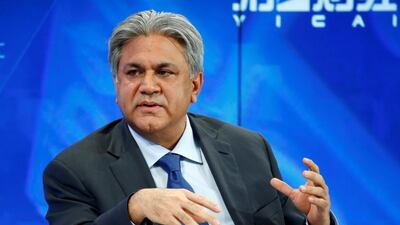First Abu Dhabi Bank, the UAE's largest lender, Al Qudra Holding and Waha Capital, among other entities, disclosed limited direct or indirect exposure to Abraaj Group, the private equity company undergoing a court-supervised restructuring amid allegations of mismanagement of investors' funds, according to regulatory filings on Tuesday.
FAB, the bank formed with the merger of First Gulf Bank and National Bank of Abu Dhabi, said it has direct exposure to Abraaj through a fully secured three-year $21.4 million (Dh78.6m) loan, due to mature in April 2019. The loan is “collateralised with Abraaj Holding stakes in its funds which invested in various companies globally”, FAB said in a statement to the Abu Dhabi Securities Exchange.
United Arab Bank has indirect exposure “through customers represented with two entities [funds] that are partially (and indirectly) owned by Abraaj”, the bank said in a filing to ADX.
Al Qudra Holding, a diversified UAE company with interests spanning real estate investment, banking, healthcare, oil and gas and project management, said it exited a direct stake in Abraaj in 2015. However, the company said it has indirect exposure totalling Dh61.6m through two independently managed client funds, the Abraaj Infrastructure and Growth Capital Fund, and Abraaj Buyout Fund II.
Al Qudra's statement said it has been assured that the portfolio management has been split from the management of Abraaj Group for several months and that the parent company restructuring has not affected the portfolio management or its value, as it is linked to market fluctuations and under independent management.
Waha Capital, an Abu Dhabi-based venture capital firm, said it has no direct exposure in Abraaj nor any of its funds. It has an indirect connection with Abraaj through Aqua Consortium (holder of the Stanford Marina group of companies, including Stanford Marina, Grandweld and Gallagher International) of which Waha owns a 49 per cent stake and the other 51 per cent is “ultimately held” by Abraaj, Waha's filing to ADX said.
However, “Waha Capital has no financial exposure to The Abraaj Group through its shareholding in the Stanford Marina group of companies and foresees no direct financial loss for Waha Capital arising from the Abraaj liquidation process,” the company said.
Sharjah-based Al Buhaira National Insurance Company has Dh8.4m worth of exposure to Abraaj, it said, while Emirates Insurance said its exposure is $2.45m.
Other entities filed statements to the bourse on Tuesday stating that they have no exposure to Abraaj. They included Abu Dhabi Commercial Bank, Invest Bank, RAK Properties, RAKBank, RAK Ceramics, Julphar Gulf pharmaceutical company, and Aramex.
The raft of disclosures come after UAE regulator the Securities and Commodities Authority in June instructed UAE-listed companies to declare their exposure to Abraaj, which at the time had filed for provisional liquidation a week earlier.
_______________
Read more:
Air Arabia says total exposure to Abraaj is $336m
UAE-listed companies declare their exposure to Abraaj liquidation - latest updates
UAE regulator asks public firms to declare exposure to Abraaj
Dubai Financial Services Authority to investigate Abraaj mismanagement claims
Abraaj founder 'reaches settlement' over bounced cheque, lawyer says
_______________
Following Tuesday’s disclosures, Sharjah low-cost carrier Air Arabia remains the entity with the largest exposure to the embattled Abraaj. It said last month it had overall exposure of $336m through fund portfolios and short-term investments, but said this had no significant impact on the airline’s operations or cash flow. The carrier has appointed experts to ensure its interests are protected as Abraaj undergoes provisional liquidation.
The disclosures so far reveal limited implications for the companies concerned, and for private equity investing in general, analysts said.
“Direct exposure is small and ultimately the Abraaj restructuring has no real systemic impact,” said Khalid Howladar, managing director of Acreditus. “The issue is more qualitative - events like this highlight some of the broader challenges regarding governance and transparency.”
Less liquidity in the private equity market should mean improved opportunities for the PE firms that remain, he added.
The Abu Dhabi Securities Exchange closed up 1.12 per cent at 4,668, while the Dubai Financial Market closed up 0.71 per cent at 2,895. Julphar was up 6.98 per cent, while FAB shares gained 1.64 per cent and Waha Capital rose 2.84 per cent.
“The eventual losses [from an Abraaj restucturing] will be quite small when compared with other examples of fund managers or financial institutions collapsing,” added Richard Segal, senior analyst at Manulife Asset Management. “It means more due diligence and a pause during this adjustment process.
“However, to the extent that private equity will remain just as viable an asset class across the markets Abraaj was investing in, this capital will eventually find new asset managers, and the eventual outcome will be a reshuffling of processes,” he said.
The fall out from Abraaj will not be “contagious" said Tariq Qaqish, managing director, asset management, at Menacorp Finance. "However, all parties need to work together to make sure these sorts of incidents are not be repeated,” he added.
Abraaj was once the Middle East’s biggest buyout company managing more than $13.6bn of assets at its peak. It came under fire this year with allegations of misusing investors’ funds in a $1bn healthcare investment vehicle. Abraaj has denied the allegations.
Through its restructuring, Abraaj reached a provisional agreement last month to sell part of its funds management business to US-based Colony Capital.
Last week, Reuters reported that Dubai’s financial services regulator the Dubai Financial Services Authority is investigating allegations of fund mismanagement at the firm, and has interviewed Abraaj founder Arif Naqvi and other senior executives as part of the probe.
Mr Naqvi has not responded to interview requests from The National. Abraaj Group declined to comment on the ADX disclosures on Tuesday.

